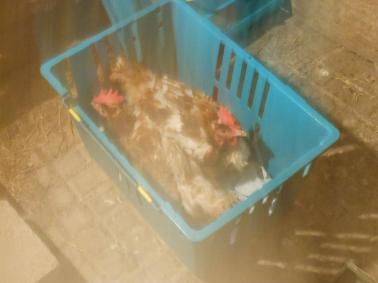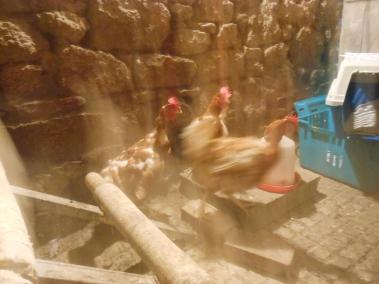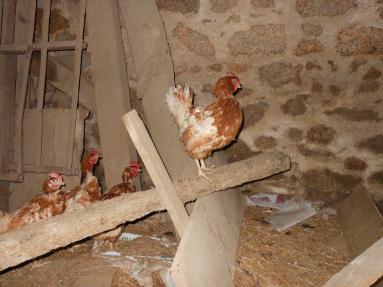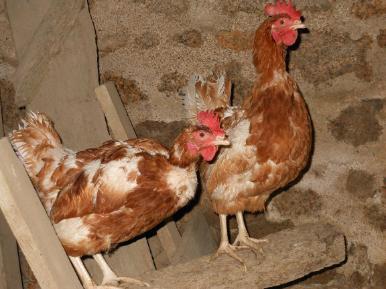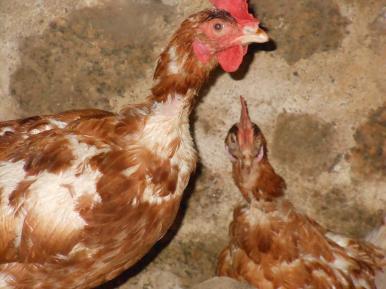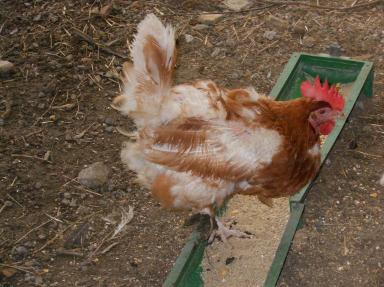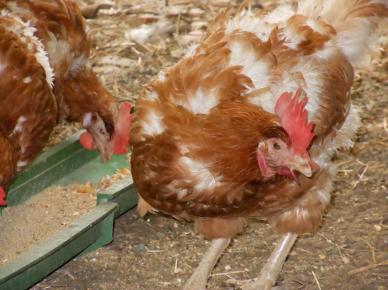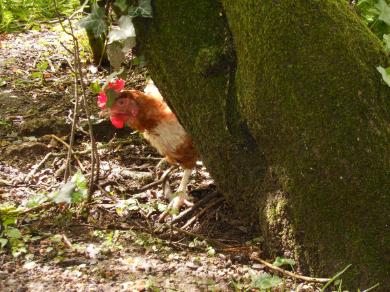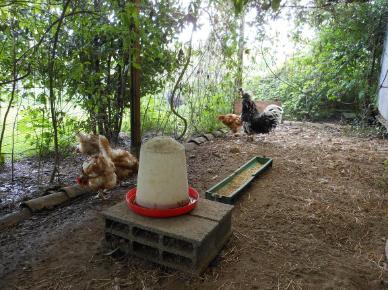Is there really so much difference?
(de Nederlandse versie van het verhaal van de 4 biochicks is hier te lezen)
Our cockerel Stevie has been excluded from the group. We have 4 cockerels roaming free. This worked very well for quite some time, until we lost 5 chickens for different reasons (Marek's disease, theft ...) over a period of a month. Result: too few hens for the remaining roosters and there is now unrest in the group.
A rooster on its own is nothing. He sits dejectedly in a corner brooding and before long he fades away and dies. So we started looking for new chickens. Not so easy because they must be vaccinated against Marek's. Now there are in our neighbourhood a lot of free range egg farms. In itself a good thing you might think: free range. And all these hens are vaccinated on day 1 against various diseases including Marek's.
Very often they sell these hens to individuals. The rest go to the slaughterhouse. The butcher does not pay much, because the meat is different from that of the broiler chicken : not so tender as these chickens are not bred for their meat.
Although they still lay an egg almost every day, they are no longer profitable for the farmer. So after a year the whole gang is replaced. We therefore decided to save four chickens from their otherwise inevitable fate to be cooked as, yes you guessed it, chicken soup.
Armed with two cats baskets we went to the farm. Outside cars are parked. One customer already has his boot open. Ready, as we shall see later, for the chickens to be simply crammed in. Another is loading his trailer. Fifty chickens in total. No easy task. While he had three upside down chickens dangling by one leg from one hand, he was trying to open the door of the trailer with the other, which also had three dangling chickens, all the while trying to stop the chickens already in the trailer from flying out.
As I said, not easy. Not surprising that a chicken escapes from his grasp. The animal flies in our direction, against a car parked next to us. In no time I catch the animal. I give the animal back to the grateful man with the comment that there are other ways to hold a chicken. But of course: his method is ingrained in him. After he makes some more loads in exactly the same way, with some chicken crying out in pain, it's our turn.
We can not go in the building, ostensibly for "bio-security" reasons. Our chickens have therefore the same fate. "And we will choose the best for you," they say, while they walk into the hangar. Dangling upside down in the hands of the owner they come out of the building. I take them from him carefully. When they are finally snug in their “first class” transport boxes on their towel next to each other, we drive home.
We all “know” that the loading of chicken is done this way. But experiencing it is something else. For these people, these are not animals, but things, objects. A scream of pain has no meaning. They don't even hear it any more.
Anyway, these four chickens are heading for a free life. At home it takes a bit of getting used to. First, they dare not leave their baskets. They are scared, more scared than the chickens that we've bought before from a similar farmer. But what disappoints me most is the damage to their feathers and their clipped beaks: I did not expect that from a “bio-chick '.
The organic market with its free-range hens prides itself on the welfare of its animals. But is there really that much difference compared to battery hens? Obviously, these animals have certainly had a lot better life. They can go outside, though outside is often no more than a quagmire around the building and a grass-less field with no trees or shrubs to shelter under. The result is that they either stay in or around the building in a mass together.
Too many chickens together leads to cannibalism. A few damaged feathers is obviously not so bad, but despite their clipped beaks it doesn't always end with a few damaged feathers. As an experienced chicken keeper I know that chickens sometimes really go at each other, resulting to terrible wounds and even death. Do I believe that the farmer has taken care of these injured animals and has given them the necessary medical care? I really do not. The hidden suffering of many of these animals is a fact, and unimaginable.
Just like their contemporaries in battery cages, these hens have their beaks clipped at a young age, an extremely painful procedure, sometimes leading to chronic pain. As they do not lay eggs, their brothers are immediately crushed or gassed after hatching.
All the remaining hens who have not been given the chance to continue their life elsewhere, even it it is after a dark ride in the boot of a car, will be unscrupulously loaded into crates. After their last ride to the slaughterhouse, many of them will be too lightly stunned so will be systematically slaughtered while still conscious. The authorities are aware of this, but not much is done about it until now (2012).
But hey, let's get back to the core of the story. As I said, these four bio-chicks will hopefully have a fine life, though it is still a little strange and new for them. And hopefully things will go well between them and our cock Stevie. Because that's what it was all about.
Back to poultry
